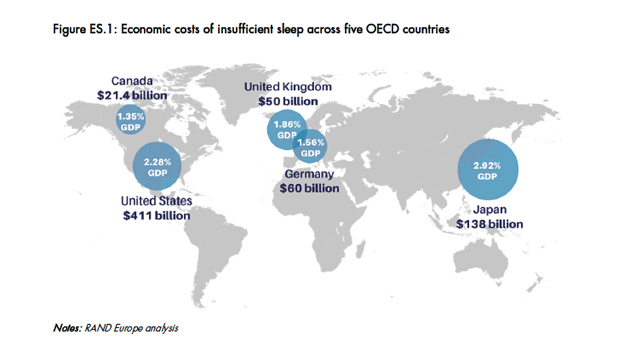
Poike/iStock
Feeling tired? Yeah, I know—it’s the middle of the week, and a lot of us are in the same boat: More than a third of Americans aren’t getting enough sleep on a regular basis. That’s doing more than messing with our moods and our health—it’s taking a measurable toll on the economy. A lack of shut-eye among US workers costs up to $411 billion every year, or 2.28 percent of the country’s GDP, according to a new study by RAND Europe, part of the RAND Corporation. That’s in part because exhaustion makes us less productive on the job.
To calculate this financial toll, RAND looked at data from more than 62,000 workers and considered how sleep-deprived people have higher mortality rates than well-rested people, miss more days of work or are less productive in the office, and may struggle to keep up in school. When it comes to the amount of money lost, the United States fares worse than some other wealthy countries from its lack of snoozing: We beat out Japan, which loses up to $138 billion annually (though Japan sacrifices a larger share of its GDP—almost 3 percent). We also lose more than Germany ($60 billion, or 1.56 percent of GDP), the United Kingdom ($50 billion, or 1.86 percent of GDP), and Canada ($21.4 billion, or 1.35 percent of GDP).

If you’ve ever needed another reason to hit the snooze button, take a look at some of the RAND researchers’ other findings:
- 1.2 million: the number of working days lost every year in the United States because of insufficient sleep. Compared with employees who sleep seven to nine hours a night, those who only get six to seven hours of rest take more time off from their jobs or aren’t as productive. On average, they lose nearly four extra days’ worth of working productivity every year compared with their better-rested colleagues. People who sleep less than six hours a night lose an average of six more days a year.
- $226.4 billion: the amount of money we could add to the US economy if everyone who slept less than six hours a night boosted their time in bed to between six and seven hours. “Improving individual sleep habits and duration has huge implications,” explains Marco Hafner, the RAND study’s main author.
- 9.2 minutes: the average amount of sleep lost every night for each employee who commutes 30 to 60 minutes home from the office, compared with those who commute 15 minutes or less. Other workplace factors can also affect sleep, the RAND researchers found, like pressure on the job. And the minutes add up, they explained: An employee who works irregular hours, commutes long distances to work, and is exposed to “workplace psychosocial risks,” such as unrealistic time pressures, sleeps on average about 28.5 minutes less per day—more than 173 hours of lost sleep per year.









